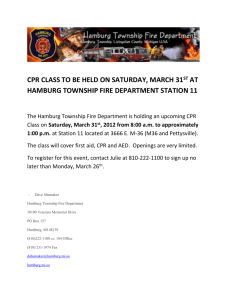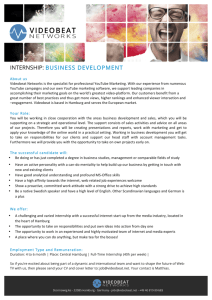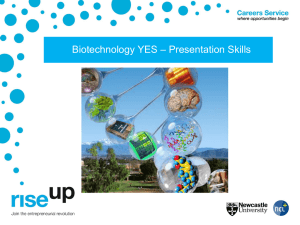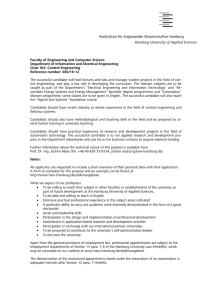09 Thomas White - Data Processing for Free Electron Lasers
advertisement
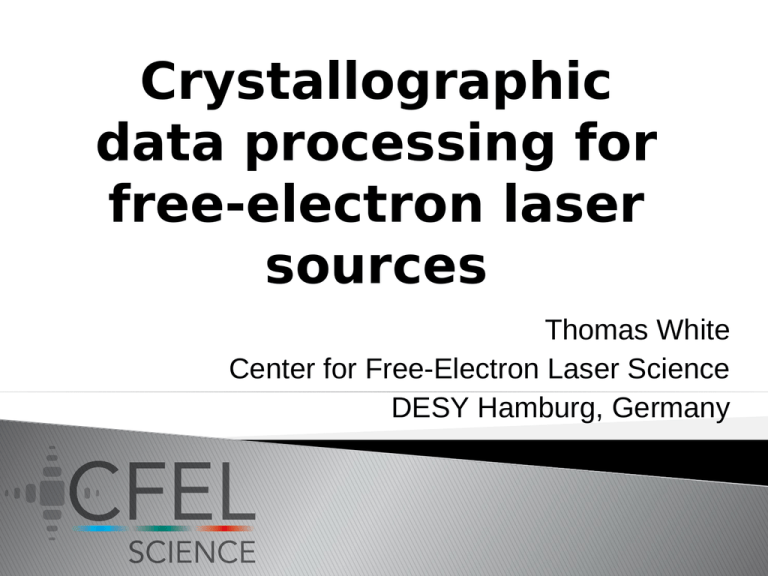
Crystallographic data processing for free-electron laser sources Thomas White Center for Free-Electron Laser Science DESY Hamburg, Germany Collaborators Henry N. Chapman1,2, Petra Fromme3, Anton Barty1, Thomas A. White1, Richard A. Kirian4, Andrew Aquila1, Mark S. Hunter3, Joachim Schulz1, Daniel P. DePonte1, Uwe Weierstall4, R. Bruce Doak4, Filipe R.N.C. Maia5, Andrew V. Martin1, Ilme Schlichting6,7, Lukas Lomb7, Nicola Coppola1, Robert L. Shoeman7, Sascha W. Epp6,8, Robert Hartmann9, Daniel Rolles6,7, Artem Rudenko6,8, Lutz Foucar6,7, Nils Kimmel10, Georg Weidenspointner11,10, Peter Holl9, Mengning Liang1, Miriam Barthelmess12, Carl Caleman1, Sébastien Boutet13, Michael J. Bogan14, Jacek Krzywinski13, Christoph Bostedt13, Saša Bajt12, Lars Gumprecht1, Benedikt Rudek6,8, Benjamin Erk6,8, Carlo Schmidt6,8, André Hömke6,8, Christian Reich9, Daniel Pietschner10, Lothar Strüder6,10, Günter Hauser10, Hubert Gorke15, Joachim Ullrich6,8, Sven Herrmann10, Gerhard Schaller10, Florian Schopper10, Heike Soltau9, Kai-Uwe Kühnel8, Marc Messerschmidt13, John D. Bozek13, Stefan P. Hau-Riege16, Matthias Frank16, Christina Y. Hampton14, Raymond Sierra14, Dmitri Starodub14, Garth J. Williams13, Janos Hajdu5, Nicusor Timneanu5, M. Marvin Seibert5, Jakob Andreasson5, Andrea Rocker5, Olof Jönsson5, Stephan Stern1, Francesco Stellato1, Karol Nass2, Robert Andritschke10, Claus-Dieter Schröter8, Faton Krasniqi6,7, Mario Bott7, Kevin E. Schmidt4, Xiaoyu Wang4, Ingo Grotjohann3, James Holton17, Stefano Marchesini17, Raimund Fromme3, Sebastian Schorb18, Daniela Rupp18, Marcus Adolph18, Tais Gorkhover18, Martin Svenda5, Helmut Hirsemann12, Guillaume Potdevin12, Heinz Graafsma12, Björn Nilsson12 and John C. H. Spence4. 1. Center for Free-Electron Laser Science, DESY, Notkestrasse 85, 22607 Hamburg, Germany. 2. University of Hamburg, Luruper Chaussee 149, 22761 Hamburg, Germany. 3. Department of Chemistry and Biochemistry, Arizona State University, Tempe, Arizona 85287-1604 USA. 4. Department of Physics, Arizona State University, Tempe, Arizona 85287 USA. 5. Laboratory of Molecular Biophysics, Department of Cell and Molecular Biology, Uppsala University, Husargatan 3 (Box 596), SE-751 24 Uppsala, Sweden. 6. Max Planck Advanced Study Group, Center for Free Electron Laser Science (CFEL), Notkestrasse 85, 22607 Hamburg, Germany. 7. Max-Planck-Institut für medizinische Forschung, Jahnstr. 29, 69120 Heidelberg, Germany. 8. Max-Planck-Institut für Kernphysik, Saupfercheckweg 1, 69117 Heidelberg, Germany. 9. PNSensor GmbH, Otto-Hahn-Ring 6, 81739 München, Germany. 10. Max-Planck-Institut Halbleiterlabor, Otto-Hahn-Ring 6, 81739 München, Germany. 11. Max-Planck-Institut für extraterrestrische Physik, Giessenbachstrasse, 85741 Garching, Germany. 12. Photon Science, DESY, Notkestrasse 85, 22607 Hamburg, Germany. 13. LCLS, SLAC National Accelerator Laboratory, 2575 Sand Hill Road. Menlo Park, CA 94025, USA. 14. PULSE Institute and National Accelerator Laboratory, 2575 Sand Hill Road. Menlo Park, CA 94025, USA. 15. Forschungszentrum Jülich, Institut ZEL, 52425 Jülich, Germany. 16. Lawrence Livermore National Laboratory, 7000 East Avenue, Mail Stop L-211, Livermore, CA 94551, USA. 17. Advanced Light Source, Lawrence Berkeley National Laboratory, Berkeley, California 94720, USA. 18. Institut für Optik und Atomare Physik, Technische Universität Berlin, Hardenbergstrasse 36, 10623 Berlin, Germany. Thomas White ‒ CFEL, DESY Hamburg 20.08.11 2 The PIs Henry Chapman Center for Free-Electron Laser Science, DESY Hamburg. John Spence Department of Physics, Arizona State University. Petra Fromme Department of Chemistry and Biochemistry, Arizona State University. Ilme Schlichting Max-Planck-Institut für medizinische Forschung, Heidelberg. Janos Hadju Laboratory of Molecular Biophysics, Department of Cell and Molecular Biology, Uppsala University. Richard Neutze Department of Chemistry, Biochemistry and Biophysics, University of Gothenburg. Thomas White ‒ CFEL, DESY Hamburg 20.08.11 3 The CAMP Team The CAMP instrument was designed and commissioned by the Max Planck CFEL Advanced Study Group Sascha Epp1, Robert Hartmann1,2, Daniel Rolles1, Artem Rudenko1, Lutz Foucar1, Benedikt Rudek1, Benjamin Erk1, Carlo Schmidt1, André Hömke1, Nils Kimmel2, Christian Reich2, Günther Hauser2, Daniel Pietschner2, Peter Holl2, Hubert Gorke3, Helmut Hirsemann4, Guillaume Potdevin4, Tim Erke4, Jan-Henrik Mayer4, Heinz Graafsma4, Michael Matysek5, Sebastian Schorb6, Daniela Rupp6, Marcus Adolph6, Tais Gorkhover6, Christoph Bostedt7, John Bozek7, Marc Messerschmidt7, Joachim Schulz4, Lars Gumprecht4, Andrew Aquila4, Nicola Coppola4, Frank Filsinger8, Kai-Uwe Kühnel9, Christian Kaiser9, Claus-Dieter Schröter9, Robert Moshammer9, Faton Krasniqi1, Simone Techert1,10, Georg Weidenspointer2, Robert L. Shoeman11, Ilme Schlichting1,11, Lothar Strüder1,2 and Joachim Ullrich1,9 1 Max Planck Advanced Study Group at CFEL, 22761 Hamburg, Germany. 2 Max Planck Halbleiterlabor, 81739 München, Germany. 3 FZ Jülich, 52428 Jülich, Germany. 4 Deutsches Elektronen Synchrotron, 22607 Hamburg, Germany. 5 Universität Hamburg, 22607 Hamburg, Germany. 6 Technische Universität Berlin, 10623 Berlin, Germany. 7 LCLS, Menlo Park, USA. 8 Fritz-Haber-Institut der MPG, Berlin, Germany. 9 Max-Planck-Institut für Kernphysik, 69117 Heidelberg, Germany. 10 Max-Planck-Institut für biophysikalische Chemie, 37077 Göttingen, Germany. 11 Max-Planck-Institut für medizinische Forschung, 69120 Heidelberg, Germany Thomas White ‒ CFEL, DESY Hamburg 20.08.11 4 Acknowledgements Rick Kirian, Nadia Zatsepin, Mark Hunter (ASU) Anton Barty (CFEL) Karol Nass, Francesco Stellato, Andy Aquila, Andrew Martin (CFEL) James Holton (LBL) ... many others ... Thomas White ‒ CFEL, DESY Hamburg 20.08.11 5 X-Ray Sources Image: European XFEL Thomas White ‒ CFEL, DESY Hamburg 20.08.11 6 The Free-Electron Laser Image: European XFEL Thomas White ‒ CFEL, DESY Hamburg 20.08.11 7 The Free-Electron Laser X-ray Laser Synchrotron Light Source Electrons pass through once. Electrons circulate millions of times. Extremely short pulses. Relatively long pulses. Extremely high brightness. Relatively low brightness. Few (1-3) experiments at a time. Many experiments at a time. Images: European XFEL, Diamond Light Source Thomas White ‒ CFEL, DESY Hamburg 20.08.11 8 LCLS — Linac Coherent Light Source Image: SLAC National Accelerator Laboratory Thomas White ‒ CFEL, DESY Hamburg 20.08.11 9 LCLS — Linac Coherent Light Source Image: SLAC National Accelerator Laboratory Thomas White ‒ CFEL, DESY Hamburg 20.08.11 10 LCLS — Linac Coherent Light Source Image: SLAC National Accelerator Laboratory Thomas White ‒ CFEL, DESY Hamburg 20.08.11 11 Experimental Setup Thomas White ‒ CFEL, DESY Hamburg 20.08.11 12 Big proteins... Transmembrane proteins control (amongst many other things) what may cross a membrane. Image: http://en.wikipedia.org/wiki/File:Polytopic_membrane_protein.png CC-BY-SA Thomas White ‒ CFEL, DESY Hamburg 20.08.11 13 Characteristics of Data... Lots of patterns: millions of images, reduced to hundreds of thousands of patterns after “hit finding”. Patterns must be indexed individually. Large number of sets of intensity data to merge. Thomas White ‒ CFEL, DESY Hamburg 20.08.11 14 Number crunching... Thomas White ‒ CFEL, DESY Hamburg 20.08.11 15 Number crunching... Software suite, CrystFEL, created for processing crystallographic data from FEL sources. Automates parts of conventional pipeline, e.g. indexing patterns (orientation determination). Specialized procedures for scaling, merging, evaluating quality of final results. Thomas White ‒ CFEL, DESY Hamburg 20.08.11 16 Number crunching... If an image can't be processed at any stage, just skip over it. Define “yield” of processing pipeline and try to maximize it. Thomas White ‒ CFEL, DESY Hamburg 20.08.11 17 Number crunching... Thomas White ‒ CFEL, DESY Hamburg 20.08.11 18 Reciprocal Space Thomas White ‒ CFEL, DESY Hamburg 20.08.11 19 Peak Shapes – Front Detector Reflection is partially recorded Thomas White ‒ CFEL, DESY Hamburg 20.08.11 20 The Rotation Method Exposure time: 100 fs Rotation step: 0.5 degrees Required rotation speed: 13.9 billion revolutions per second Thomas White ‒ CFEL, DESY Hamburg 20.08.11 21 The “Monte Carlo” Method The sum of a large number of samples converges to the integrated intensity. Thomas White ‒ CFEL, DESY Hamburg 20.08.11 22 The “Monte Carlo” Method The sum of a large number of samples converges to a constant. Thomas White ‒ CFEL, DESY Hamburg 20.08.11 23 The “Monte Carlo” Method ∫ =C The sum of a large number of samples converges to a constant. Thomas White ‒ CFEL, DESY Hamburg 20.08.11 24 The “Monte Carlo” Method The volume of the reciprocal lattice point. Crystal size (and shape). Incident intensity (SASE fluctuations). “Targeting accuracy”. Beam fluctuactions (different bandwidth each shot). Crystal quality – mosaicity? ... all of the above are “integrated out” to constants. Thomas White ‒ CFEL, DESY Hamburg 20.08.11 25 The “Monte Carlo” Method This does actually work, both in simulation and experiment: Kirian et al., Optics Express 18 (2010) p5713-5723 But you need a lot of patterns... Thomas White ‒ CFEL, DESY Hamburg 20.08.11 26 The “Monte Carlo” Method Thomas White ‒ CFEL, DESY Hamburg 20.08.11 27 Phasing the Data At this point, our data goes into the conventional MX analysis pipeline. 3PCQ Thomas White ‒ CFEL, DESY Hamburg 20.08.11 28 PS1 at higher resolution (June 2010) Resolution increased from 8.5A to 7.4A due to slightly higher photon energy. Improved data processing and detector behaviour. Thomas White ‒ CFEL, DESY Hamburg 20.08.11 29 PS1 at higher resolution (June 2010) DEN refinement and graphics by Axel Brunger Thomas White ‒ CFEL, DESY Hamburg 20.08.11 30 PS1 at higher resolution (June 2010) DEN refinement and graphics by Axel Brunger Thomas White ‒ CFEL, DESY Hamburg 20.08.11 31 PS1 at higher resolution (June 2010) DEN refinement and graphics by Axel Brunger Thomas White ‒ CFEL, DESY Hamburg 20.08.11 32 PS1 at higher resolution (June 2010) DEN refinement and graphics by Axel Brunger Thomas White ‒ CFEL, DESY Hamburg 20.08.11 33 Beyond Monte Carlo: Scaling of Partials Fox and Holmes (1966) method: Set up full non-linear least squares for the scale factors and solve to get the best ones. Computational time: number of patterns squared. Kabsch (2010) method: Combine everything with equal scale factors, then scale everything to the result, and repeat. Computational time: number of patterns. Thomas White ‒ CFEL, DESY Hamburg 20.08.11 34 Beyond Monte Carlo: Scaling of Partials Thomas White ‒ CFEL, DESY Hamburg 20.08.11 35 Beyond Monte Carlo: Scaling of Partials Least squares target for post refinement: Optimise the fit between this pattern and the others, by varying the parameters which affect partiality: Orientation, bandwidth, ... Thomas White ‒ CFEL, DESY Hamburg 20.08.11 36 Beyond Monte Carlo: Scaling of Partials Thomas White ‒ CFEL, DESY Hamburg 20.08.11 37 Indexing Ambiguities Some crystal lattices have geometry which looks the same in two or more different orientations, despite the actual crystal not having this symmetry. Thomas White ‒ CFEL, DESY Hamburg 20.08.11 38 Beyond Monte Carlo: Scaling of Partials Our situation is a mixture model: each measurement comes from one of two (or more) possible distributions, one for each of the “twin partners”. A mixture model is a classic example of the use of the expectation-maximisation (EM) algorithm. Simply put, we start with random twin assignments, refine the scale factors, then maximise the fit by varying the assignments. Thomas White ‒ CFEL, DESY Hamburg 20.08.11 39 Scaling and Post Refinement First, scale the intensities with partiality estimates (from the initial geometry estimate). For each pattern, refine the geometry, wavelength, bandwidth etc to get the best match with the model. Re-scale the intensities. Maximise the fit by varying the twin assignments, using the current estimate as a lower bound. Repeat until converged. Thomas White ‒ CFEL, DESY Hamburg 20.08.11 40 The European XFEL Image: European XFEL Thomas White ‒ CFEL, DESY Hamburg 20.08.11 41 Sounds Interesting? Other positions available besides this one! Thomas White ‒ CFEL, DESY Hamburg 20.08.11 42 Main publication Chapman et al., Nature 470 (2011) p74. Injector DePonte et al., J. Phys. D 41, (2008) 195505 CAMP instrument Strüder et al., Nuclear Instruments and Methods in Physics Research A 614 (2010) p483. Monte Carlo integration Kirian et al., Optics Express 18 (2010) p5713. Phasing by shape transforms Spence et al., Optics Express 19 (2011) p2866. PDB entry 3PCQ Thomas White ‒ CFEL, DESY Hamburg 20.08.11 43

